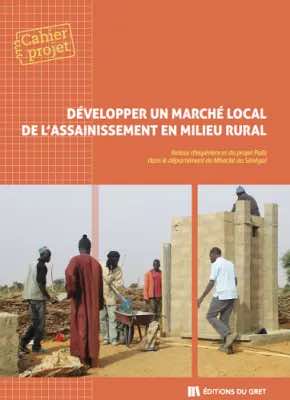Location
Groupe de Recherches et d'Echanges Technologiques (GRET) (French, Group For Research and Technology Exchanges) is a non-governmental association supporting international cooperation, professional solidarity and poverty reduction in the countries of Asia, Africa, Europe and Latin America. It was established in the late 1970s.
Its activities include implementation of field projects, expertise, studies, research, running information and exchange networks. The main spheres of attention are:
- Access to Essential Services
- Sustainable Food and Agriculture
- Institutional Development, Actors, Territories
- Information and Communication for Development
- Microfinance and Small Enterprise
- Public Policies and International Regulations.
The Association is financed mainly by the European Union, the World Bank, the French Ministry of Foreign Affairs, the French Development Agency and also by the Asian Development Bank, Unicef, USAID and many others.
Members:
Resources
Displaying 1 - 5 of 87Les conditions d’intégration d’un accompagnement aux communs dans les politiques publiques : le cas du contexte agrosylvopastoral du Sahel (vallée du fleuve Sénégal)
Les perturbations climatiques, l’évolution démographique et les sécheresses des dernières décennies, ont contribué à une rupture d’équilibre entre les systèmes de production pastorale et agricole, au détriment des pasteurs. À côté de ce contexte écosystémique, d’autres facteurs viennent aggraver la situation pastorale dans le Sahel, en particulier le rétrécissement de l’espace pastoral, grignoté par l’expansion des terres agricoles.
Note politique du Comité Forêt: Numéro 1 - Octobre 2021
Définir les termes « forêt », « déforestation » et « dégradation des forêts », est un préalable incontournable dans la conception et la mise en œuvre de toute stratégie visant à éliminer la déforestation importée. Cette définition doit s’adapter à la diversité des contextes écologiques rencontrés, et aux outils de suivi disponibles
Préparée par : Richard Eba’a Atyi (CIFOR), Sylvie Gourlet-Fleury (CIRAD), Richard Sufo (Université Le Mans), Frederic Amiel (IDDRI), Philippe Guizol (CIRAD), Pierre Couteron (IRD),
Développer un marché local de l’assainissement en milieu rural
Fin 2015, alors que le taux d’accès à l’assainissement amélioré en zone rurale se situe autour de 40 %, le Sénégal renouvelle sa Stratégie nationale d’assainissement rural, dont l’ambition s’accorde avec les Objectifs du développement durable, visant la fin des pratiques de défécation à l’air libre et l’universalité de l’accès à l’assainissement amélioré.
Myanmar: Millions of farmers are at risk of being considered trespassers on their own lands
In Myanmar, millions of farmers are at risk of being considered trespassers on their own land after the adoption of a controversial law. The “Vacant, Fallow and Virgin Land Management Law” (VFV) was amended and approved by the NLD majority Parliament in September and March marks the deadline when all occupants of these lands type should have ask for a permit for it or risk a jail sentence and a fine. Gret, alongside with other international, national and local NGOs, is mobilized to halt the implementation of this law.
Myanmar: Landlessness
In Myanmar, almost half of the rural population is said to be landless : it is the highest rate of landlessness in the Mekong region. With agriculture as the engine of Myanmar’s economy, employing more than two thirds of the population and accounting for one third of GDP, various studies in Myanmar provide contrasting figures on landlessness and indicate that the problem stems from a lack of clarity in the concept of landlessness.





